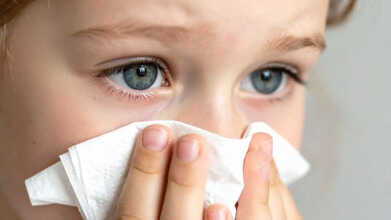- Health Conditions A-Z
- Health & Wellness
- Nutrition
- Fitness
- Health News
- Ayurveda
- Videos
- Medicine A-Z
- Parenting
Weekly Health Horoscope For September 29 To October 5, 2024: Schedule Time For Mindfulness And Relaxation This Week, Zodiacs

Weekly health horoscope
Aries
This week, Aries, your vitality is great; yet, be careful not to overdo it. Make sure you balance enough rest with your aspirations. Participate in intellectual pursuits since they will help you prevent exhaustion. To keep your mental clarity, concentrate on correct relaxation and mindfulness methods.
Taurus
Taurus, your realistic approach will help you both physically and emotionally this week. This is a great moment to start habits supporting personal hygiene. Give your health first priority by adding physical exercise and a balanced diet. Schedule time for mindfulness and relaxation to help you pay attention to your mental health.
Gemini
Gemini, this week you will be most suited in communication. Even if you are mentally sharp, remember to take rests to prevent mental tiredness. To complement your mental exercise, do light physical activities as stretching or walking. Make sure you're sleeping enough to revitalize body and mind; keep hydrated.
Cancer
Cancer, your increased sensitivity this week could be emotionally taxing. You should give healing and self-care first priority. Use yoga, writing, or meditation to help you to balance your feelings. Surround oneself with encouraging people to assist negotiate any emotional strain.
Leo
Leo, if not under control, your great energy levels could cause you to feel exhausted. Although success in the workplace is somewhat common, one should keep harmony. Emphasize the need of keeping your ground and including relaxation into your agenda. Meditating and light exercise will help you keep balance.
Virgo
Virgo, this week reminds you to pay special attention to health practices and routines. This is a great moment to polish your exercise and dietary schedules. Steer clear of changing your calendar drastically that will induce stress. To prevent emotional and physical tiredness, keep to your plans and pace yourself.
Libra
Libra, your search for harmony this week covers your mental and physical health. Give a harmonic regimen including mental relaxation, pleasant sleep, and physical exercise top priority. Moreover, open and honest conversation with the people around you will help you to relax.
Scorpio
Your passionate disposition, Scorpio, can cause both emotional and physical tiredness this week. You should temper your excitement and concentration on self-care. Rest balances your creative activities, and be aware of keeping reasonable emotional limits in personal contacts.
Sagittarius
Sagittarius, your exploring attitude will help you this week with your health. Your body and mind will be energized by physical activities appropriate for your curious personality, such hiking or experimenting with different workout programs. Watch your overcommitting to work and make sure you provide time for rest and leisure.
Capricorn
Though this week's emphasis is on professional ambitions, Capricorn reminds us not to neglect our own needs. Make sure your program includes stress-reducing physical exercises like swimming or yoga. Focus especially on any symptoms of tiredness and give restorative techniques like meditation or decent sleep first priority.
Aquarius
Aquarius, your creative enthusiasm this week could cause mental overstimulating. To keep general wellness, make sure you mix your artistic interests with physical exercise like swimming or cycling. Stay aware of your financial situation since it affects your mental state; think about using leisure activities to control stress.
Pisces
Pisces; your intuition will lead you throughout the emotional highs and lows of this week. To keep inner serenity, give spiritual activities as meditation or deep breathing top priority. To save your mental health, try not to combine your personal and business life. Regular exercise—even in modest amounts—will also ground you.
Adenovirus: Is The Mystery Illness That’s Spreading Highly Contagious?

Credits: Canva
A little-known virus is spreading steadily across different parts of the world, prompting growing concern among health experts. Often described as “untreatable” because there is no targeted antiviral medicine available, adenovirus is drawing attention due to how tough it is and how quickly it can pass from person to person.
Eric Sachinwalla, medical director of infection prevention and control at Jefferson Health, has cautioned that while most healthy individuals develop only mild illness, people in high-risk groups may face more serious health problems. This raises an important question: just how contagious is this mystery illness that is spreading?
Adenovirus: How Contagious Is It?
Yes, adenovirus is highly contagious and spreads with ease in several ways. It can pass through respiratory droplets released during coughing or sneezing, close physical contact such as hugging or shaking hands, and contact with contaminated surfaces like toys and towels.
It can also spread through fecal matter, particularly during diaper changes, and in some cases through water. According to the CDC, the virus spreads quickly in crowded settings such as schools and daycare centres and can survive for long periods on surfaces, making good hygiene especially important for young children and people with weakened immune systems.
Who Do Adenoviruses Affect Most?
Adenoviruses can infect people of all age groups, but they are most commonly seen in children under the age of five. In babies and young children, the virus often spreads in daycare environments where close contact is common. Children are also more likely to put shared objects in their mouths and may not wash their hands as regularly.
Among adults, adenoviruses tend to spread in crowded living conditions. People staying in dormitories or military housing may have a higher risk of infection. The virus is also known to circulate in hospitals and nursing homes, as per CDC.
Those with weakened immune systems are more likely to become seriously ill from an adenovirus infection. This includes people who have undergone organ or stem cell transplants, as well as those living with cancer or HIV/AIDS. Individuals with existing heart or lung conditions may also face a higher risk of severe illness.
Adenovirus: What Are The Symptoms Of An Adenovirus Infection?
The symptoms of an adenovirus infection depend on the part of the body affected. Most commonly, the virus targets the respiratory system. When it infects the airways, it can cause symptoms similar to a cold or the flu. These may include:
- Cough.
- Fever.
- Runny nose.
- Sore throat (pharyngitis).
- Pink eye (conjunctivitis).
- Ear infection (otitis media).
- Swollen lymph nodes.
- Chest cold (bronchitis).
- Pneumonia.
Adenoviruses can also infect the digestive system. When this happens, diarrhea may occur, along with gastroenteritis. Gastroenteritis is inflammation of the stomach or intestines and can lead to stomach pain, diarrhea, nausea, and vomiting.
In rarer cases, adenoviruses can affect the bladder or the nervous system. Infection of the bladder may result in urinary tract infections. When the nervous system is involved, it can lead to serious conditions affecting the brain, including encephalitis and meningitis.
Flu Incubation Period: How Long Does It Take For Symptoms To Appear?

Credits: Canva
Influenza, commonly called the flu, is a respiratory infection caused by the influenza virus. It is contagious, which means it passes easily from one person to another. Although influenza viruses can circulate throughout the year, infections are seen more often during the fall and winter months. This time is known as the flu season. As flu cases are rising across many parts of the US and UK, here are a few key points to understand, from the incubation period to how easily the virus spreads.
What Is The Flu (influenza)?
The flu is an infection caused by the influenza virus. It usually leads to symptoms such as body and head aches, sore throat, fever, and breathing-related discomfort, which can sometimes become serious. Flu cases tend to peak during the winter months, when large numbers of people may fall ill at the same time, a situation described as an epidemic, according to the Cleveland Clinic.
Flu: What Is The Incubation Period Of The Flu?
The average incubation period of the flu is around 2 days, though it can vary from 1 to 4 days. In simple terms, this means most people begin to notice flu symptoms a few days after the virus enters the body.
When Does The Flu Become Contagious?
After catching the flu virus, a person can start passing it on to others about 1 dayTrusted Source before symptoms appear. Keep in mind that the usual incubation period is about 2 days. So, if someone is exposed to the virus on a Saturday morning, they may already be able to spread it by Sunday evening. By Monday afternoon, flu symptoms are likely to show up. These symptoms can be mild or severe.
Some people may not develop symptoms at all, but they can still spread the virus. The flu is usually most contagious during the first 3 days of illness. After symptoms begin, a person may continue to infect others for another 5 to 7 days. Children, older adults, and people with weaker immune systems may remain contagious for a longer time.
Flu Symptoms 2025: Early Symptoms You Need To Take Care Of
Unlike the common cold, which tends to develop slowly, flu symptoms often appear suddenly.
Common symptoms include:
- feeling extremely tired, exhausted, or weak
- headache
- blocked or runny nose
- sore throat
- dry cough
- muscle and body aches
- fever or chills, although not everyone gets these
- vomiting or diarrhoea, which is seen more often in children
Most people start to feel better within a few days to two weeks. However, some individuals may need antiviral medication, particularly those at higher risk of serious complications.
How Does The Flu Spread?
The flu mainly spreads through tiny respiratory droplets released when an infected person coughs or sneezes. In crowded places, these particles can be inhaled by others, leading to infection. The virus can also spread by touching objects or surfaces that carry the virus, such as door handles or shared personal items. Outside the body, the virus can survive on surfaces for up to one day.
If someone touches a contaminated surface and then touches their eyes, nose, or mouth, the flu virus can enter the body and cause infection.
Taking Warfarin? Doctor Warns This Common Food Could Be Reducing Your Medication’s Effect

Credits: Canva
People who are prescribed blood thinners, also known as anticoagulants, could unknowingly weaken the effect of their medication by eating a widely consumed and otherwise healthy vegetable, a doctor has warned.
What Are Anticoagulants?
Anticoagulants are routinely given to reduce the risk of blood clots and are often prescribed to those who face a higher chance of such complications. This group also includes people at increased risk of heart attacks or strokes. These medicines, which include rivaroxaban, apixaban and warfarin, work by interrupting the clotting process and play a key role in preventing serious conditions such as strokes, heart attacks, pulmonary embolism and deep vein thrombosis.
Warfarin: Why This Common Vegetable Can Be A Problem
While anticoagulants are effective and often lifesaving, patients are being advised that a familiar garden vegetable could interfere with how well these drugs work. The warning comes from Dr Chris Steele, who appeared on ITV’s This Morning to explain how certain foods can interact negatively with different medications.
As part of his advice, he said, as per Express, “Leafy greens are high in vitamin K, which helps blood to clot. Warfarin works by blocking vitamin K production, so if you suddenly increase how many greens you eat, it can affect how the medicine works.”
He added: “Other foods that contain a lot of vitamin K include green vegetables, egg yolks, chickpeas and lentils. These foods don’t need to be removed from the diet, but it is important to keep your intake steady and consistent. You should also avoid drinking large amounts of cranberry juice or using cranberry products while on anticoagulants, as they can alter the effect of warfarin. Garlic and ginger should be limited too, as they can raise the risk of bleeding.”
Warfarin: Other Food And Drug Interactions To Watch For
Dr Chris also highlighted that many other medicines can react in unexpected ways when taken alongside certain foods and drinks. For example, he noted that some antibiotics, including ciprofloxacin, can react poorly with milk.
He explained: “Calcium can reduce how well some antibiotics work, so these medicines should not be taken at the same time as foods high in calcium, such as milk, yoghurt or cheese. Calcium supplements should also be avoided for a few hours before and after taking these antibiotics.
“You should not drink milk when taking certain antibiotics, including tetracycline and ciprofloxacin, which are quinolone antibiotics, or some osteoporosis drugs like alendronate, also known as Fosamax.”
He further advised avoiding the following combinations with specific medicines:
- Grapefruit if you are taking statins for high blood pressure
- Black liquorice if you are on certain heart medicines such as digoxin
- Bananas if you take some ACE inhibitors for high blood pressure
- Coffee if you use bronchodilators for asthma
- Smoked salmon and salami if you are prescribed antidepressants
- Limes if you are taking cough medicine
Dr Chris stressed: “Always speak to your doctor about any precautions you should follow when starting a new medication. You may need to avoid certain foods, make changes to your lifestyle, or take other steps to prevent unwanted side effects.”
© 2024 Bennett, Coleman & Company Limited

